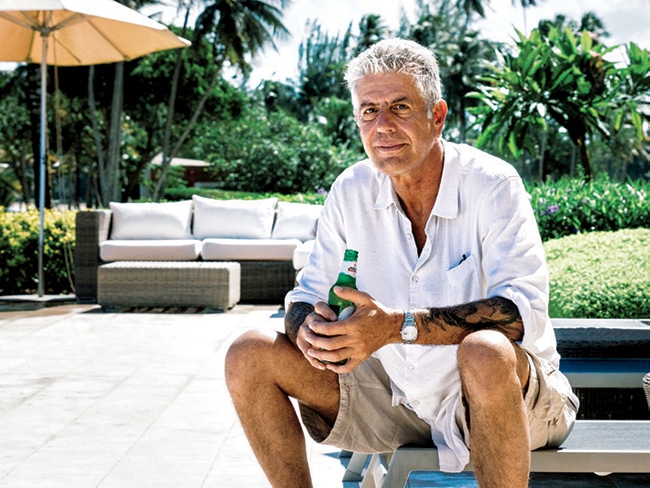![]()
South Beach Wine & Food Festival vets Anthony Bourdain and José Andrés kick off a new culinary getaway and talk Miami's best bites and the changing food industry.
Anthony Bourdain at Dorado Beach, a Ritz-Carlton Reserve in Dorado, Puerto Rico.
Besides being the globe-trotting personality behind CNN’s Parts Unknown and a New York Times best-selling author, Anthony Bourdain is—and will always be—a cook at heart. He recently joined friend José Andrés (the force behind ThinkFoodGroup and The Bazaar by José Andrés) for the inaugural José Andrés & Friends Culinary Getaway at Dorado Beach, a Ritz-Carlton Reserve in Dorado, Puerto Rico. Amid a cornucopia of paella parties, chef cook-offs, rum craft-cocktail classes, beach-side seafood barbecues, and Champagne brunching, two of the food world’s elite still found time to sit down with Ocean Drive and dish on the past, present, and future of the food industry—particularly in burgeoning Miami.
What is the most significant breakthrough moment in food that has taken place during your lifetime? Anthony Bourdain: There are two. When Americans started eating sushi and decided sometime in the ’70s that raw fish was desirable, that was a big, big win; everything started to get better after that. And Fergus Henderson—[The Whole Beast:] Nose to Tail Eating, and his restaurant St. John in London is probably the most influential restaurant in my life. José Andrés: Obviously El Bulli. I was very young—16 or 17—and I couldn’t say what, but I knew something was happening, like you are the first person in something that is going to be highly influential later, but in the moment you don’t realize. Looking back 30 years, I see that [as a] key moment in not only my life, but also the culinary world.
What poses the biggest threat to the food industry? AB: The biggest danger is coming from this glut of kids coming out of culinary school who want to be chefs immediately [and] on Top Chef and get a reality-TV show without putting in the time in the system that we all came up in, which is you clean squid for a few years and you start at the bottom. I’m part of the problem; I didn’t intend to glamorize cooking—I didn’t think I was. People forget that it’s about making the same thing under very hot, difficult conditions.
What do you hope to see happen in the next 20 years? JA: We’re going to see the revolt of the real food industry versus the “fake” food industry. More and more [I wouldn’t call it fast food but] fast food with great-name chefs, [where well-known chefs] will be behind concepts that are not affordable for the few but for the many. AB: Chefs are becoming much more ideological. It’s no coincidence that a lot of the real activism is coming from the top, from chefs addressing food deserts and changing the American diet. McDonald’s sales are eroding, and more people like José are entering the marketplace looking to create fast, affordable food that’s actually good for you.
What’s the most important food-industry issue nobody is talking about? AB: Racism. In an industry that’s always been open to everybody, notoriously so—every refugee and fugitive, dysfunctional character in the world could always find a home in a restaurant—why aren’t there more African-American chefs and African-American cooks represented in the mid- to high-range restaurants? JA: Out of 11 million undocumented people in this country, 2 to 3 million—the people taking care of the farms, doing distribution, cooking, washing dishes, running kitchens—are in the food industry directly, yet we don’t want to recognize they belong to the system. If we go down to the heart of the problem, every single senator or congressman should be prosecuted because they are eating a salad that was probably picked by an undocumented person.
With today’s media-driven world, how important is it to get approval from the big magazines and publications and critics? JA: When Rocco DiSpirito—who is one of the most talented chefs that showed up in America in the last 20 years—was put on the cover of Gourmet and became the wonder boy of New York, it was the worst thing that happened to him. He was supposed to be one of the great chefs, and all of a sudden with the press, TV, something happened. AB: He was surprisingly good; now he’ll be a professional wrestler in five years. It’s not how good you are today, but will you still be good in five years?
Where does Miami fall on the culinary map, and what does it need to do to get to the next level? AB: Miami is a tough town because you have a transient workforce, and the clientele are transient as well. If you’re in fine dining, you need the protection of a hotel. Who wants to wear a jacket in Miami? It’s hot, you’ve had a few cocktails, you’re on vacation; do you really want to commit to a white tablecloth? I don’t. I want to eat Cuban food or go to José’s and eat by the pool. JA: Miami is a city that is still trying to find itself. I’m still trying to figure out Miami. I’m missing more of the Latin; Miami should be a Latin town.
What’s your In-N-Out Burger equivalent or go-to place in Miami? AB: I’m having a medianoche or a Cubano for sure. Yardbird for the fried chicken. I go to the Club Deuce; that’s my go-to place. JA: I go to that sushi place, Sushi Deli, in a very ugly (as ugly as ugly gets) mall, but the guy does knockout sushi.
What do you have planned for the South Beach Wine & Food Festival? JA: A version of last year’s poolside paella event. We’re mixing it up a little bit.

